
Mononucleosis: The Kissing Disease
Since the virus that causes mononucleosis is particularly abundant in secretions in the mouth, nose, and throat, the most certain way of spreading it from person to person is by French kissing. The virus also lives in cervical secretions and can be acquired through the performance of cunnilingus. The Epstein-Barr Virus that causes kissing fever (mononucleosis) activates the immune system to fight it with fever. The low-grade fever the body generates to control the virus can last as long as three months, and the immune system will maintain antibodies against the infection for life. Nearly 90% of the population of the United States has been exposed to the virus that causes mononucleosis at one time or another.

Epstein-Barr Virus, The Mononucleosis Virus
The "mononucleosis virus" is the Epstein-Barr virus, also known as EBV. This is the virus that is also associated with chornic fatigue syndrome. When people who have weakened immune systems are exposed to this virus, they may develop symptoms other than just those of mononucleosis. EBV can cause a condition known as oral hairy leukoplakia, or rough, white, "hairy" spots in the mouth and throat, and sometimes even non-Hodgkin's lymphoma. The virus "hangs out" in the tonsils. Sometimes mononucleosis results in "kissing tonsils," tonsils that are so enlarged that they touch each other. The rubbing of the tonsils prevents normal removal of white blood cells and mucus from their surfaces with the result of intensely unpleasant breath.
- Important notification about information and brand names used in this slideshow!
- Photo courtesy of Laura Billings by Flickr : www.flickr.com/photos/twenty_questions/2192450204/
- Aalto SM, Linnavuori K, Peltola H, et al. Immunoreactivation of Epstein-Barr virus due to cytomegalovirus primaryinfection. J Med Virol. Nov 1998. 56(3):186-91.

Causes Of Mononucleosis
As an infectious disease, mononucleosis is always caused by the Epstein-Barr Virus, although the disagreeable symptoms of mononucleosis are caused not by the virus itself but by the immune system's reaction to the virus. If your immune system is so sick that it can't respond to the virus, then the virus can cause direct damage to lymph tissues throughout the body, starting with the tonsils and possibly eventually spreading to the bloodstream, but this is rare. There is a special risk of infection to people who have a condition called X-linked lymphoproliferative syndrome, but this condition has occurred in only 400 people in only 100 people worldwide.
- Important notification about information and brand names used in this slideshow!
- Photo courtesy of Jes by Flickr : www.flickr.com/photos/mugley/294395274/
- Chaganti S, Ma CS, Bell AI, et al. Epstein-Barr virus persistence in the absence of conventional memory B cells: IgM+IgD+CD27+ B cells harbor the virus in X-linked lymphoproliferative disease patients. Blood. Aug 1 2008. 112(3):672-9.

How Does Mono Spread?
As the name "kissing disease" suggests, mononucleosis is most often spread by kissing, most often by "French kissing," which involves the exchange of saliva. Since the virus can also establish itself in the external genitals, mono can also be spread by oral sex and mutual masturbation, although sexual contact is not necessary to contract the disease. Mononucleosis is also spread in rare instances by blood transfusions. In the United States, 50% of children who have not reached the age of 5 have come in contact with the disease, presumably though the the exchange of saliva and nose secretions not involving French kissing, and another quarter are exposed to the disease by the age of 15.
- Important notification about information and brand names used in this slideshow!
- Photo courtesy of James Gathany by Wikimedia Commons : commons.wikimedia.org/wiki/File:Sneeze.JPG
- Andersson J, Ernberg I. Management of Epstein-Barr virus infections. Am J Med. Aug 29 1988.85(2A):107-15.

How Long Does Someone Who Has Mono Stay Contagious
The symptoms of mononucleosis don't begin to manifest themselves for 1 to 2 months after exposure to the Epstein-Barr Virus that causes the disease. By the time the chronic fatigue or the sore throat associated with the disease set in, most people won't remember where or with whom they could have caught it. People who have had mono continue to be infectious for six to eighteen months after symptoms end, and the virus can reappear in the saliva from time to time throughout life. You are most likely to get a large enough dose of the virus to cause full-blown symptoms when you kiss someone whose symptoms include enlarged tonsils. Since enlarged tonsils also cause bad breath, the spread of the disease is somewhat self-limiting.
- Important notification about information and brand names used in this slideshow!
- Photo courtesy of Catie Sayeg by Flickr : www.flickr.com/photos/catiesayeg/5146028857/
- Fafi-Kremer, S. Journal of Infectious Disease, 2005
- vol 191(6): pp 985-989.

How Do I Know I Have Mono?
The one symptom that almost everyone who comes down with mononucleosis has to deal with is unremitting fatigue. The Epstein-Barr Virus (EBV) that causes mononucleosis is also the culprit in the longer-lasting version of the disease, chronic fatigue syndome. Mononucleosis also often (but not always) causes sore throat, especially in the tonsils. When the tonsils become so enlarged that they can be recognized as "kissing tonsils," severe halitosis typically becomes a problem. The disease can cause viral hepatitis, enlargement of the spleen, eye pain, chest pain, and sensitivity to light. Some people who develop the disease also have chronic joint or muscle pain, although these are not common.
- Important notification about information and brand names used in this slideshow!
- Photo courtesy of ashley rose by Flickr : www.flickr.com/photos/ashleyrosex/3254507997/
- Akashi K, Eizuru Y, Sumiyoshi Y, et al. Brief report: severe infectious mononucleosis-like syndrome and primary human herpesvirus 6 infection in an adult. N Engl J Med. Jul 15 1993. 329(3):168-71.
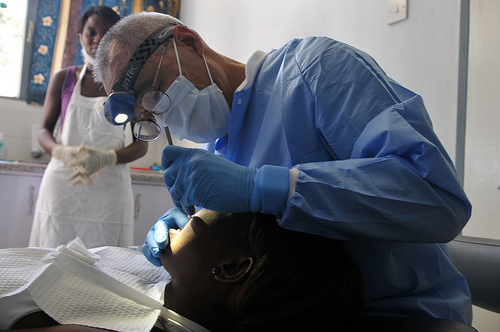
How Do Doctors Diagnose Mono?
When you come in to your doctor's office with the symptoms of mononucleosis, your doctor will run a blood test to see whether you have been infected with the Epstein-Barr Virus. Called the Monospot heterophile antibody test, this lab test catches about 85% of all cases of mono infections and is 100% specific to the disease. In rare cases, you can get false positive test results for mono if you have recently been exposed to rubella (or taken a vaccination for rubella), or if you have certain kinds of blood cancers that will show other unmistakeable symptoms. For the most part, however, mono is a relatively easy diagnosis.
- Important notification about information and brand names used in this slideshow!
- Photo courtesy of US Army Africa by Flickr : www.flickr.com/photos/usarmyafrica/5725061669/
- Al-Jitawi SA, Hakooz BA, Kazimi SM. False positive Monospot test in systemic lupus erythematosus. Br J Rheumatol. Feb 1987. 26(1):71.
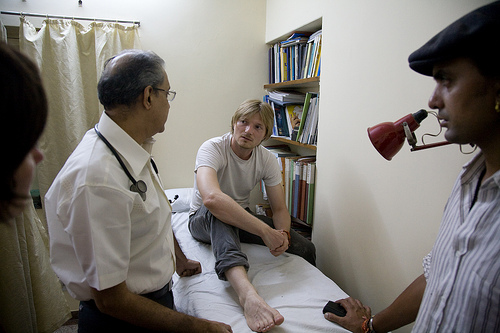
What Is The Treatment For Mononucleosis?
There is no drug against the Epstein-Barr Virus that causes mononucleosis. Sometimes doctors give the antivirals acyclovir or ganciclovir to stop the spread of the virus, but these medications don't have any benefit in relieving symptoms or shortening the time people who have full-blown mononucleosis stay sick. Doctors sometimes treat some of the complications of mononucleosis, however. Tonsils that become extremely large may be taken out. Doctors may prescribe steroids for extremely sore throat. Mono sometimes is accompanied by strep throat. Because strep is highly contagious and can cause problems with the heart and cardiovascular system, it should be treated with antibiotics used under a doctor's supervision.
- Important notification about information and brand names used in this slideshow!
- Photo courtesy of Todd Gehman by Flickr : www.flickr.com/photos/pugetive/4094014314/
- Cirilli AR. Emergency evaluation and management of the sore throat. Emerg Med Clin North Am. 2013 May.31(2):501-15. doi: 10.1016/j.emc.2013.01.002. Epub 2013 Feb 18. Review. PMID: 23601485.

Are There Any Long-Term Effects of Mononucleosis?
Mononucleosis can be a real drag for up to six months. It causes fatigue that just won't go away. It disrupts romances and social life. You can't even share a glass or a toothbrush with someone. But in the majority of cases of mono, the symptoms either are so mild they are never even noticed or they last just a few weeks before energy returns to normal. The people who are most likely to have ongoing problems with chronic fatigue are those who are infected with both the Epstein-Barr Virus that causes mono and the relatively common sexually transmitted disease Chlamydia. People who have chronic autoimmune diseases, especially multiple sclerosis, are also at higher risk of complications from mono.
- Important notification about information and brand names used in this slideshow!
- Photo courtesy of aptmetaphor by Flickr : www.flickr.com/photos/aptmetaphor/2231940446/
- Fukuda K, Straus SE, Hickie I, Sharpe MC, Dobbins JG, Komaroff A. The chronic fatigue syndrome: a comprehensive approach to its definition and study. International Chronic Fatigue Syndrome Study Group. Ann Intern Med. Dec 15 1994.121(12):953-9.

Complications And Lasting Effects of Mono
Mononucleosis typically doesn't cause any complications or long-lasting effects. Many people who are infected with the mono virus don't even know it, although they may spread the infection to other people. When mono causes complications, it is mostly likely to be a problem with the spleen. White blood cells generated by the immune system accumulate in the spleen so it burst, requiring an emergency splenectomy. Severe abdominal pain is a sign that the spleen may have ruptured and a trip to the emergency room is necessary. Mono can also cause a severe rash that can be mistaken for hives; any rash and breathing problems is also a reason for a trip to the ER.
- Important notification about information and brand names used in this slideshow!
- Photo courtesy of Lisa Brewster by Flickr : www.flickr.com/photos/sophistechate/2758739495/
- Hickey SM, Strasburger VC. What every pediatrician should know about infectious mononucleosis in adolescents. Pediatr Clin North Am. Dec 1997. 44(6):1541-56.














-Arthritis_f_280x120.jpg)


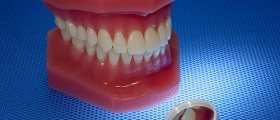

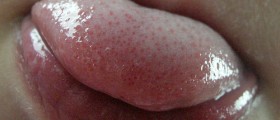





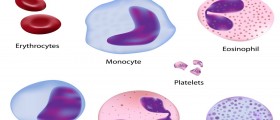

Your thoughts on this
Loading...